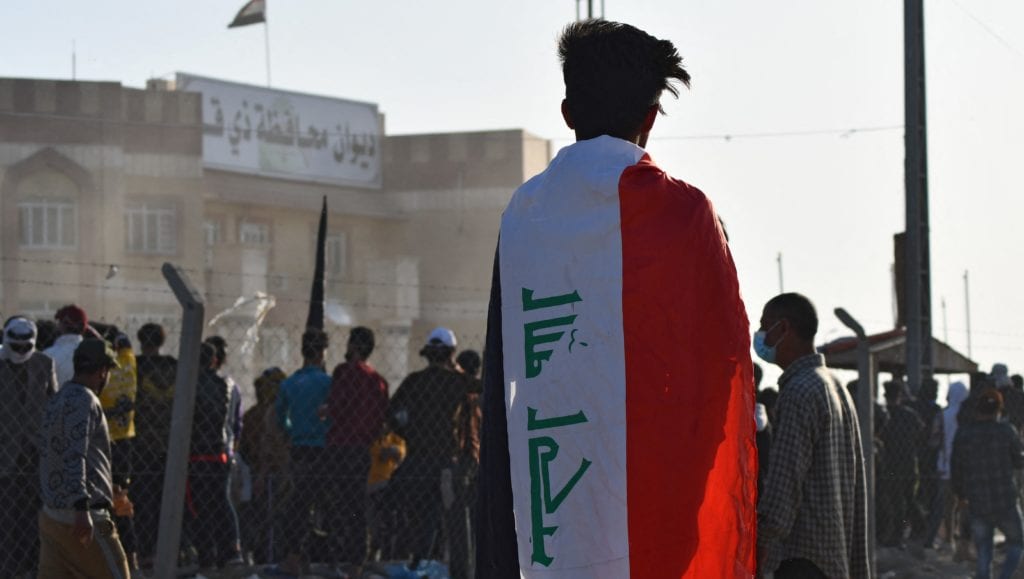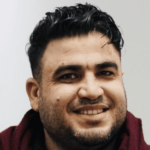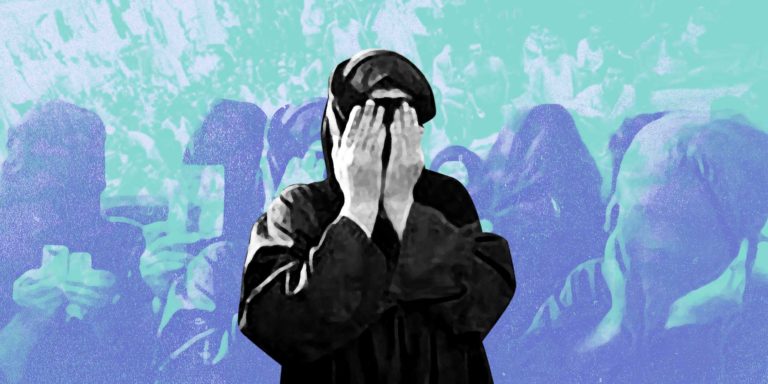“My eyes went for the sake of the homeland.” With these words Mohamed Hassan started talking about the suffering of millions of Iraqis with special needs. Mohamed is not more than 25 years old. At the height of the protests at Tahrir Square in Baghdad in October 2019, he was hit by a smoke grenade.
As a result, he lost his eye sight.
“Close your eyes for two seconds, can you?” Mohamed asked with his typical Baghdadi accent in an attempt to explain his suffering. All efforts to restore his eye sight so far failed.
“I went to a lot of doctors, but have lost all hope,” he told Daraj. “For three years I have been living in tragic conditions. I have two children without the means to survive. No one has knocked on my door. Yet I need someone to support me.”
According to Mohamed, the smoke grenade made a hole in his forehead, which still continues to bleed from time to time.
“I still need treatment, but my financial situation does not allow me, and this produces a huge psychological pressure,” he said. “My family shares my pain and we face it all alone.”
The 2019 October protests left about 25,000 people wounded, some 5,000 of whom have been permanently disabled. There are many stories similar to Mohamed’s. One of them is that of 24-year-old Mustafa Al-Ghazi. He too was hit by a smoke grenade during the protests. “In December 2000, near Al-Khilani Square, I was hit by a smoke grenade that smashed the muscle of my right foot,” Mustafa told Daraj. “I never received any help.”
Due to his injury which turned into a permanent disability, Mustafa is unable to work. Yet, despite his suffering, his disability is a source of pride to him and his family, as they see the 2019 uprising as a key chapter in the modern history of Iraq. Mustafa and Mohamed are just two of the thousands of Iraqis who paid a hefty price for their political stance against the ruling parties. They call for compensation, and accountability for all those responsible for their suffering.
The 2019 protests are hardly the sole cause of Iraq’s disabled. The country has a long history of war and conflict that has left generations of Iraqis with disabilities.

The World’s Largest
According to UN, Iraq has the world’s highest number of disabled people in relation to its population due to war, conflict, accidents and birth defects.
Most of them do not have any source of income and struggle to obtain special care. They furthermore face major obstacles to get an education. In addition, their integration into society faces many barriers. According to official statistics, people with disabilities number some 1.5 million, more than 13 percent of the Iraqi population. However, non-governmental organizations claim the number is much higher than that.
“Unfortunately, our country is a producer of disability,” said Mustafa Al-Saadi, a member of the Board of Directors of People with Disabilities in Iraq.
“More than 4 million people with disabilities suffer from exclusion, marginalization and deprivation. They have a lack of access to information, legal help, health insurance, and rehabilitation.”
“Many other issues prevent the integration of disabled people into Iraqi society,” said the 35-year-old. “UN conventions, ratified by Iraq, guarantee their rights. But they need to be implemented. Iraqi politicians should be serious about ending the suffering of the disabled.”
Biggest Obstacle
The suffering of people with special needs is not limited to the lack of government services, care and aid. Society’s negative view of them is another barrier to their integration, depriving them of their legitimate rights. However, many disabled people are trying to break with the negative stereotype.
Al-Saadi has a visual impairment since birth. Yet for many years, he has worked as a car mechanic, relying on his other senses, such as touch and hearing, having learnt the profession from his father when he was young.
Many people are surprised when they see him at work. “My success has given me self-confidence and I have big dreams,” he said.
But Mustafa’s ambition does not stop there. Rather he hopes to be able to help his peers, especially seeing the fact many disabilities are the result of a certain political stand.
Read Also:







